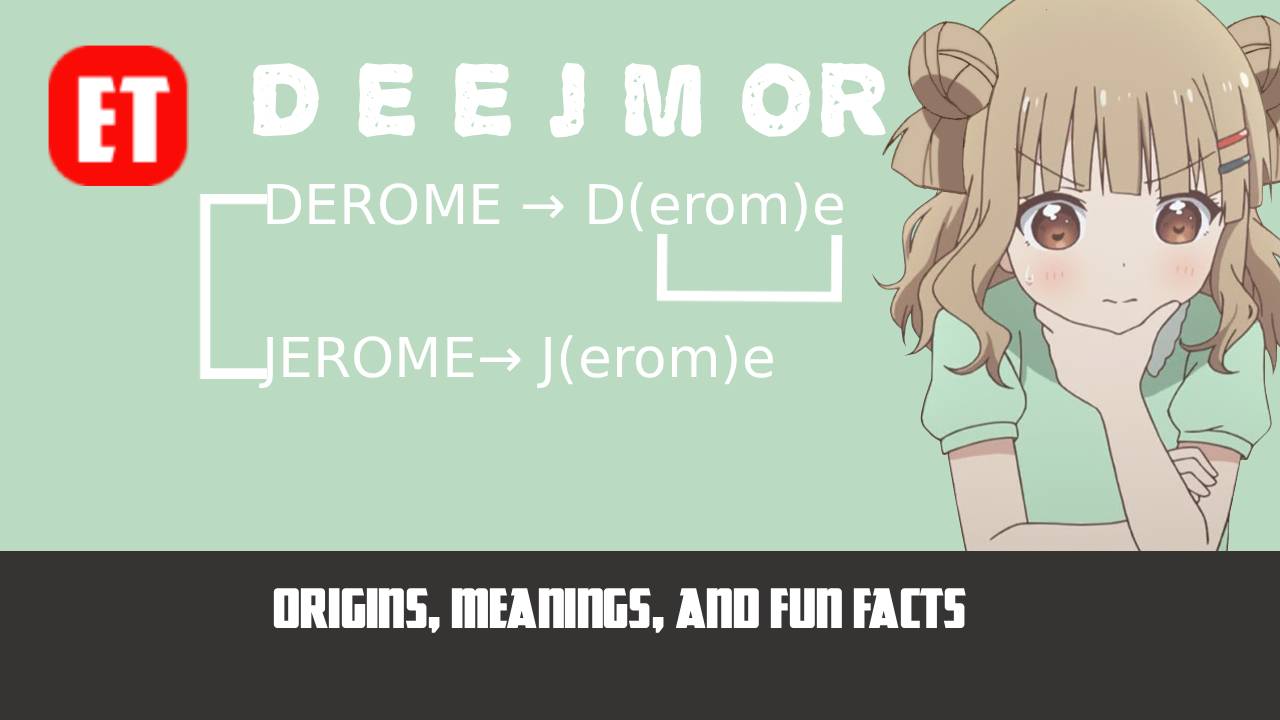
D E E J M OR is a creative term connecting three distinct names: Derome, Jerome, and Perome.
The concept often uses a stylized form where the middle letters “erom” appear in parentheses — D(erom)e, J(erom)e, and P(erom)e.
This stylistic choice hides part of the name visually while still keeping its recognizable sound.
Each of these names has its own history, origin, and cultural reference.
Below, we explore their meanings, backgrounds, and a few interesting facts.
DEROME → D(erom)e
The surname Derome has French origins.
It is believed to mean “from Rome” or “of Rome,” possibly referencing migration or trade connections with the ancient city.
Some historians also link it to the Old French word romer, meaning “to wander” (speculative).
In France, the name appears in historical records from the Middle Ages.
When written as D(erom)e, the “erom” portion is visually hidden in parentheses.
This creates a modern, minimalist look while preserving its root.
Fun fact:
In medieval England, similar surnames like Dering and Deering appeared after the Norman Conquest.
Scribes often changed spellings based on local dialects.
JEROME→ J(erom)e

The name Jerome comes from the Greek Hierōnymos, meaning “sacred name.”
It entered Latin as Hieronymus and spread through Europe via Christian tradition.
One of the most famous historical figures with this name is Saint Jerome, a 4th-century scholar and theologian.
He is best known for translating the Bible into Latin, producing the Vulgate.
Saint Jerome is also the patron saint of librarians, students, and translators.
Stylized as J(erom)e, the name keeps its pronunciation but changes its appearance.
Fun fact:
Saint Jerome is often depicted with a lion in art.
Legend says he removed a thorn from the lion’s paw, and the animal stayed with him for life.
PEROME → P(erom)e
Perome is a rare surname and given name.
Historical records show very few instances of it.
Its exact origin and meaning are unclear, though it may be a variant of another name (speculative).
In its stylized form P(erom)e, the letters in parentheses make the word more abstract and modern.
In the “D E E J M OR” word chain, Perome is connected to the phrase “Rome now Mero.”
Here, “Rome” refers to the ancient city founded, according to legend, by Romulus, its first king.
“Mero” refers to a contemporary singer and rapper, linking ancient history to modern music culture.
Fun fact:
The transformation from “Rome” to “Mero” is a playful example of letter rearrangement.
Many music artists create stage names using similar methods.
From Derome to Jerome to Perome
The journey from Derome to Jerome to Perome is both linguistic and visual.
All three share the sequence of letters “erom.”
By placing it in parentheses, the shared part becomes less obvious but still present.
The shift moves from Derome, a surname tied to place, to Jerome, a sacred personal name, and finally to Perome, a rare and possibly modernized form.
This chain ends with “Rome now Mero,” bridging ancient legend with modern music identity.
Linguistic Notes
- Parentheses inside names are not a standard spelling practice.
- It is a stylistic choice used for visual effect.
- The base pronunciation usually remains the same after this change.
FAQ About Erome and Perome
Q1: What is the meaning of Erome?
Erome, when written in full, can refer to a personal or brand name. In the D E E J M OR context, it is part of a stylized form like D(erom)e or J(erom)e.
Q2: What is the origin of Perome?
Perome is extremely rare and may be a variation of another surname. Its origins are uncertain.
Q3: Why are the letters “erom” hidden in parentheses?
It is a visual design choice. It hides part of the word while keeping the sound intact.
Q4: Who was Romulus?
Romulus is the legendary founder and first king of Rome, an important figure in Roman mythology.
Q5: Who is Mero?
Mero is a stage name for a modern singer and rapper. The “Rome now Mero” phrase connects ancient history to modern music culture.





